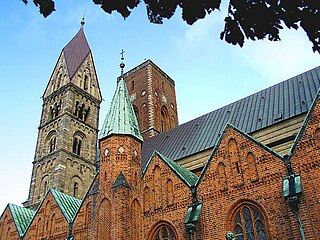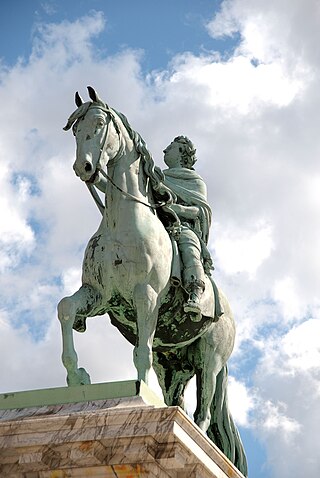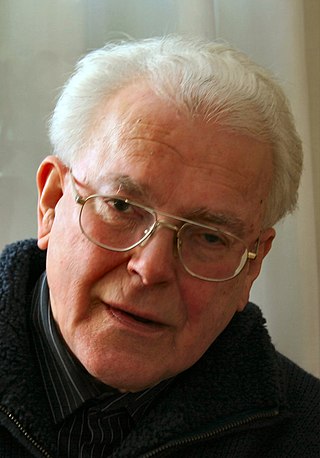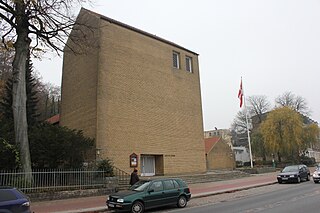
Southern Schleswig is the southern half of the former Duchy of Schleswig in Germany on the Jutland Peninsula. The geographical area today covers the large area between the Eider river in the south and the Flensburg Fjord in the north, where it borders Denmark. Northern Schleswig, congruent with the former South Jutland County, forms the southernmost part of Denmark. The area belonged to the Crown of Denmark until Prussia and Austria declared war on Denmark in 1864. Denmark wanted to give away the German-speaking Holsten and set the new border at the small river Ejderen. Prussian chancellor Otto von Bismarck concluded that this justified a war, and even proclaimed it a "holy war". He also turned to the Emperor of Austria, Franz Joseph I of Austria for help. A similar war in 1848 had gone poorly for the Prussians. With Prussia's modern weapons and the help from both the Austrians and General Moltke, the Danish army was destroyed and forced to make a disorderly retreat. The Prussian-Danish border was then moved from the Elbe up in Jutland to the Kongeåen creek.

Flensburg is an independent town in the far north of the German state of Schleswig-Holstein. After Kiel and Lübeck, it is the third-largest town in Schleswig-Holstein.

Frederick I was King of Denmark and Norway. He was the last Catholic monarch to reign over Denmark and Norway, when subsequent monarchs embraced Lutheranism after the Protestant Reformation. As king of Norway, Frederick is most remarkable in never having visited the country and was never crowned as such. Therefore, he was styled King of Denmark, the Vends and the Goths, elected King of Norway. Frederick's reign began the enduring tradition of calling kings of Denmark alternatively by the names Christian and Frederick.

The Danish ethnic minority in Southern Schleswig, Germany, has existed by this name since 1920, when the Schleswig Plebiscite split German-ruled Schleswig into two parts: Northern Schleswig with a Danish majority and a German minority was united with Denmark, while Southern Schleswig remained a part of Germany and had a German majority and Danish and Frisian minority populations. Their historic roots go back to the beginning of Danish settlement after the emigration of the Angles. One of the most common names they use to describe themselves is danske sydslesvigere.

Aabenraa is a town in Southern Denmark, at the head of the Aabenraa Fjord, an arm of the Little Belt, 26 kilometres (16 mi) north of the Denmark–Germany border and 32 kilometres (20 mi) north of German town of Flensburg. It was the seat of Sønderjyllands Amt until 1 January 2007, when the Region of Southern Denmark was created as part of the 2007 Danish Municipal Reform. With a population of 16,505, Aabenraa is the largest town and the seat of the Aabenraa Municipality.

The Youth in the South Schleswig Voters' Association is a political youth organization in Germany. It is the youth wing of the South Schleswig Voters' Association
The Danish Scout Council is the national Scouting federation of Denmark. Scouting was founded in Denmark in 1909 and it was among the charter members of WOSM in 1920. Denmark has 70,000 Scouts.
The Scout and Guide movement in Denmark consists of about ten different associations. Most of them are members of two large federations, but there are also some independent organizations. Affiliated to Danish Scouting and Guiding are the organizations in Greenland, on the Faroe Islands and in Southern Schleswig.

Jaruplund Højskole is the only Danish folk high school in Southern Schleswig, Germany and is located 10 km south of the border in Flensburg. As a meeting point between two cultures, the school's programs focus on promoting greater understanding between the two nations and Europe at large.

The Diocese of Ribe is a diocese within the Church of Denmark. Ribe Cathedral serves as the central cathedral within the diocese. Since 2014, the bishop has been Elof Westergaard.

The DGF Flensborg is a German association football club from the city of Flensburg, Schleswig-Holstein.

Denmark and Germany are full members of NATO and of the European Union. The border between the countries, which lies in the Schleswig region, has changed several times through history, the present border was determined by referendums in 1920. The Danish-German border area has been named as a positive example for other border regions. Substantial minority populations live on both sides of the border, and cross-border cooperation activities are frequently initiated.

Danish sculpture as a nationally recognized art form can be traced back to 1752 when Jacques Saly was commissioned to execute a statue of King Frederick V of Denmark on horseback. While Bertel Thorvaldsen was undoubtedly the country's most prominent contributor, many other players have produced fine work, especially in the areas of Neoclassicism, Realism, and in Historicism, the latter resulting from growing consciousness of a national identity. More recently, Danish sculpture has been inspired by European trends, especially those from Paris, including Surrealism and Modernism.

Günter Weitling (1935-2024) was a Lutheran theologian, historian, and author.

Haderslev Cathedral also known as Our Lady's Church is the cathedral church of the Diocese of Haderslev located in Haderslev, Denmark

Maren Sørensen (1882–1957) is considered to be the first female Danish priest. She was ordained by the independent Grundtvigian cleric Niels Dael in 1940 in Havrebjerg. Sørensen is also remembered for her extensive work as a nurse, foster mother and family carer in Southern Jutland.

Louise Gustave Dorothea Hildegard Wright née Bauditz (1861–1935) was a Danish philanthropist, feminist and peace activist. From 1913, she headed the philanthropic Præmieselskabet for Plejemødre, an association for foster mothers which supervised over 600 foster children. She was also an active member of Danske Kvinders Nationalråd where she served as vice-president. In 1915, she was one of the founding members of the Danske Kvinders Fredskæde, the Danish chapter of the Women's International League for Peace and Freedom, serving as a board member (1921–1924).

Ansgar Church is an evangelical lutheran church in northern Flensburg, Germany. Its congregation is the largest within the Danish Church in Southern Schleswig.

Julie Frederikke Ramsing née Vallentin (1871–1954) was a Danish pacifist, feminist and philanthropist who is remembered above all for organizing three-month convalescence trips to Denmark for malnourished German children after the end of the First World War. As chair of the Committee for Schleswig Children's Holiday Trips from 1919 to 1948, every year she arranged for children from Southern Schleswig to stay with families in the Danish countryside. She also contributed much to maintaining the cultural identity of Danish families living in Germany.

Stefan Seidler is a Danish-German politician of the South Schleswig Voters' Association (SSW), the party representing the interests of the Danish and Frisian minority populations in Germany. He was elected to the Bundestag from Schleswig-Holstein in the 2021 German federal election. His election represented the first time the SSW won a seat since 1949. The SSW last contested a federal election in the 1961 West German election.


















